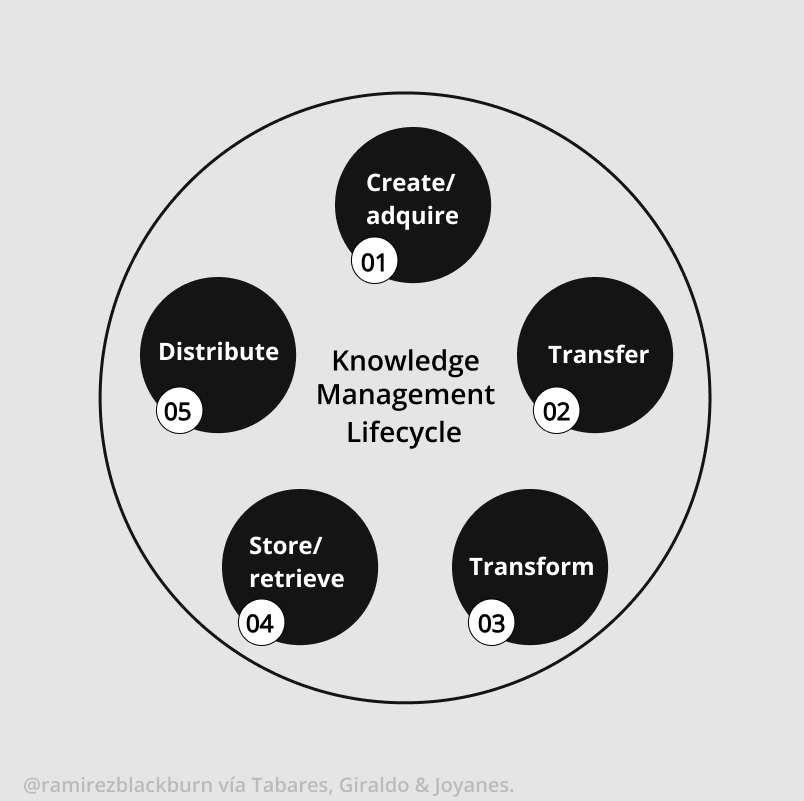Knowledge Management and Digital Transformation Colombia

The relationship between Knowledge Management and Digital Transformation is relevant to enterprises that work to stay up-to-date in the digital age. In Colombia, small and big organizations from different industries face challenges related to digital transformation. Adopting a strategic knowledge management approach as a driver of transformation could lead organizations to embrace change and survive in the demanding digital age.
What is Knowledge Management?
According to Hannah Wren from Zendesk (2020), Knowledge Management is the process of gathering, setting, and sharing information across an organization, including the technology used to manage those procedures.
What types of knowledge can we find within an organization?
There are three main types of knowledge:
Tacit knowledge comes from personal experience and intuition. This kind of knowledge is difficult to communicate since it resides in our brains.
Explicit knowledge is documented and easily accessible knowledge.
Implicit knowledge stems from processes, routines, and organizational culture. It can exist in documented formats or less explicit terms.
Knowledge Management Cycle
In 2016, Marta Tabares, Liliana Giraldo, and Luis Joyanes researched in the Colombian industry to propose a model that integrates knowledge management to business process management. In the article, Improving the Business Processes Management from Knowledge Management (2016), they suggest a knowledge management lifecycle which is “a set of adapted and standardized stages that can be implemented in organizations.” (p. 2).

Digital Transformation
Digital Transformation is defined as “anything from IT modernization (for example, cloud computing), to digital optimization, up to the invention of new digital business models.” (Gartner)
Digital Transformation in Colombia 2021
This year, Virtus Partners, a senior management consulting organization, has estimated the digital maturity level of the organizational ecosystem in Colombia. They applied their Digital Maturity Index, which is an instrument that measures the level of Digital Transformation of small, medium, and large organizations. The five levels of digital maturity established on this index are:
- Analog (0% – 35%)
- Initial (35% – 55%)
- Medium (55% – 75%)
- Advanced (75% – 90%)
- Digital (90% – 100%)
According to the 2021 Virtus’ Digital Maturity Index Report, organizations in Colombia have an Initial level of digital maturity accounting for 42,9% on the scale. Reportedly, “this average is largely due to the low score obtained by SMEs, which constitute 68.4% of the sample and whose index score of 37.1% positions them slightly above the Analog level.” (p. 10).
This index evaluates six dimensions as the core of digital transformation:
- Customer experience
- Strategy
- Organizational culture and change management
- Innovation and new business models
- Data and analytics
- Technology processes and digital operations
Therefore, it is interesting to analyze the role of knowledge management in the construction of an organizational culture that boosts digital transformation.
Organizational Culture, Change Management, and Knowledge Management
Building a knowledge-sharing culture inside organizations is very beneficial to digital transformation processes. As stated by McKinsey, “Organizations that focus on transforming culture and building capabilities during a transformation are 2.5 times more likely to succeed.” By the 2021 Knowledge Management report of G2, some of the main benefits of knowledge management within organizations are:
- The possibility to access advanced insight, knowledge, and experience over time regardless of role
- Promoting collaborative work through the accessibility of information
- Integration of knowledge silos across the community
- Communication increase and decision making support
- Retention of company knowledge
- Making scarce expertise accessible across the community
- Promotion of continued professional development.
Ultimately, fostering an open knowledge-sharing culture empowers communities to change.
Knowledge Management and Digital Transformation in Colombia
By the 2021 Virtus Report, talent is essential to drive any digital transformation process. However, according to their research in Colombia “the shortage of professionals specialized in this field, in addition to the lack of knowledge that some leaders still present in this regard and the scarce resources available in certain organizations, mean that [key talent] is not always available.” (p. 25).
Virtus Partners recommends that organizations in Colombia “develop reskilling and upskilling programs, to prepare employees to take advantage of the full power of data and new technologies in their work, as well as to adopt new practices, knowledge, and skills” (p.25).
As Jorge Ospina, Chief Information Officer of Bancolombia, stated in the podcast Leaders of change in July 2021, the main challenge that this bank has faced in its digital transformation process is talent management. This fact confirms the relevance of knowledge management within large organizations and even more so in medium and small companies that seek to adapt to change and get ahead. Establishing a structured knowledge management is essential for organizations in Colombia to scale the knowledge and abilities to succeed in digital transformation processes.
Ultimately, transversal knowledge management can connect the whole community to work towards a shared vision.
References
Knowledge Management System Examples, Types & Tools (Hannah Wren, Zendesk) – Access here
What is Knowledge Management? (Atlassian) – Access here.
Tabares, L. Giraldo, and L. Joyanes, “Improving the Business Processes Management from Knowledge Management,” pp. 2-3, ACM, 2016.
Gartner Glossary: Digital Transformation – Access here.
Digital Maturity Index Virtus (IMDV®) – Access here.
McKinsey, Digital Culture and Capabilities – Access here.
Best Knowledge Management Software (G2) – Access here.
Podcast “Leaders of Change” (Accenture and Jorge Ospina Bancolombia’s CIO) – Access here.